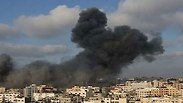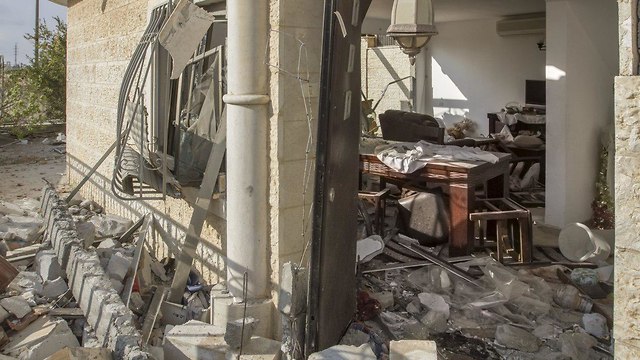
The cost of Israel's restraint in Gaza
Op-ed: Over the past six months, Hamas has realized the Israelis understand only force and has achieved a series of achievements that Israel, with its policy of restraint, failed to prevent. Israel must no reach an agreement under fire and without first restoring its deterrence.
Even if it's not entirely clear what would be the extent of the IDF's ramped up response to Hamas's escalation in violence, one thing is clear: Israel must not reach an agreement under fire and without first restoring its deterrence.

The deterrence from Operation Protective Edge lasted three years and eight months. The political leadership did not take advantage of this quiet to achieve a convenient arrangement with Hamas, and this has been its main mistake.
Over the past six months, Hamas has realized that the Israelis understand only force, and that has been working out nicely for the terror group. If the Israeli reaction doesn't change in the wake of a grave incident like the rocket fire early Wednesday—the situation would only deteriorate.

Prime Minister Netanyahu and Defense Minister Lieberman hold situation assessment (Photo: Hagai Dekel)
On March 29, Hamas decided to change the equation, and they've been successful: first with the "March of Return" on the border, the violent rioting, the launching of incendiary and explosive balloons, rounds of fighting they initiated, and lately the mass infiltrations into Israel.
The military and the government didn't handle these cases correctly—not the balloons, when at first they didn't stop their launchers; and not the rounds of fighting that the IDF ended with no operational achievements. Furthermore, despite the infiltrations, the IDF didn't reintroduce the ban on Palestinians entering the 300-meter buffer zone on the border.
Over the past six months the prime minister, as well as the defense minister, have mostly been busy making threats that turned out to be empty. It were those empty threats that allowed the situation to deteriorate to this level.
The rocket fire on Wednesday morning surprised both the IDF and the political leadership. They were all busy preparing for the arrival of Egyptian intelligence head Kamel Abbas to the Gaza Strip, Ramallah and Jerusalem to wrap up the loose ends on the ceasefire deal.
Hamas claims it was not responsible for the rocket fire at Be'er Sheva and central Israel. But only two organizations in the strip have the kind of rockets fired on Wednesday—Hamas and Islamic Jihad. The damage caused is extensive and unusual because this rocket had more than the standard 20 kilograms of explosives.
The launchers of the rocket did so in a calculated manner. It was definitely not the result of a lightning strike, as Hamas claimed, but rather because someone wanted to achieve another victory before the arrangement that the same someone also hoped to achieve, and so it was convenient for that someone to also appear as the one seeking to halt the fire.
Israel must not allow this situation and so it requires a response—before Israel agrees to an arrangement. The retaliatory attacks on Wednesday were not as significant despite the videos released by the IDF. The only terrorist killed was the result of the thwarting of a cell trying to launch rockets at the Hof Ashkelon Regional Council.
IAF attacks rocket launching cell (צילום: דובר צה"ל )
Meanwhile, some of the Hamas leaders have gone underground, and the organization evacuated its command posts to limit the IDF's ability to carry out assassinations.
The IDF presented the Cabinet with different levels of operations, but it's clear that both the military and political leadership lack the kind of trickery Israel excelled at during Operation Cast Lead and Operation Protective Edge. In 2008, then-defense minister Ehud Barak ordered to open the Gaza border crossings despite the unending rocket fire, and then the next day he ordered strikes on dozens of Hamas targets. In 2014, Barak and Netanyahu went to the Golan Heights for a photo up to divert media attention to Syria, while the Air Force carried out a strike taking out Hamas commander Ahmed Jabari.
For six months that Netanyahu and Lieberman's policy of restraint is not working. There's no reason to believe that if they continue on the same path now, it'll suddenly start bearing fruit.


















